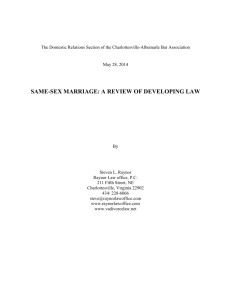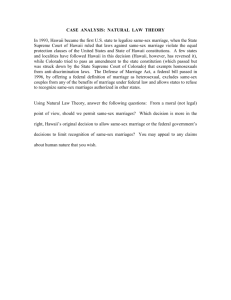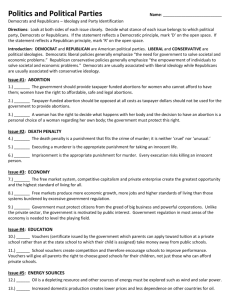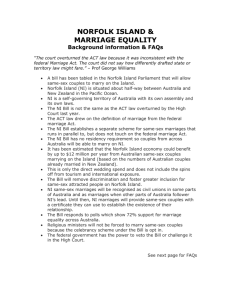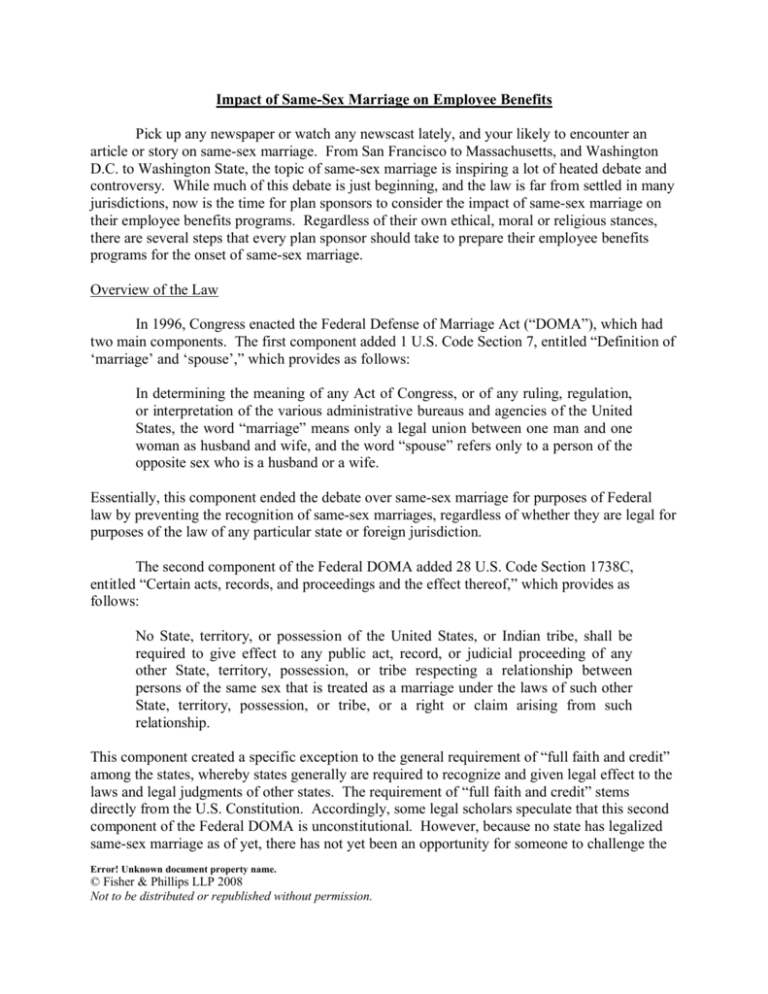
Impact of Same-Sex Marriage on Employee Benefits
Pick up any newspaper or watch any newscast lately, and your likely to encounter an
article or story on same-sex marriage. From San Francisco to Massachusetts, and Washington
D.C. to Washington State, the topic of same-sex marriage is inspiring a lot of heated debate and
controversy. While much of this debate is just beginning, and the law is far from settled in many
jurisdictions, now is the time for plan sponsors to consider the impact of same-sex marriage on
their employee benefits programs. Regardless of their own ethical, moral or religious stances,
there are several steps that every plan sponsor should take to prepare their employee benefits
programs for the onset of same-sex marriage.
Overview of the Law
In 1996, Congress enacted the Federal Defense of Marriage Act (“DOMA”), which had
two main components. The first component added 1 U.S. Code Section 7, entitled “Definition of
‘marriage’ and ‘spouse’,” which provides as follows:
In determining the meaning of any Act of Congress, or of any ruling, regulation,
or interpretation of the various administrative bureaus and agencies of the United
States, the word “marriage” means only a legal union between one man and one
woman as husband and wife, and the word “spouse” refers only to a person of the
opposite sex who is a husband or a wife.
Essentially, this component ended the debate over same-sex marriage for purposes of Federal
law by preventing the recognition of same-sex marriages, regardless of whether they are legal for
purposes of the law of any particular state or foreign jurisdiction.
The second component of the Federal DOMA added 28 U.S. Code Section 1738C,
entitled “Certain acts, records, and proceedings and the effect thereof,” which provides as
follows:
No State, territory, or possession of the United States, or Indian tribe, shall be
required to give effect to any public act, record, or judicial proceeding of any
other State, territory, possession, or tribe respecting a relationship between
persons of the same sex that is treated as a marriage under the laws of such other
State, territory, possession, or tribe, or a right or claim arising from such
relationship.
This component created a specific exception to the general requirement of “full faith and credit”
among the states, whereby states generally are required to recognize and given legal effect to the
laws and legal judgments of other states. The requirement of “full faith and credit” stems
directly from the U.S. Constitution. Accordingly, some legal scholars speculate that this second
component of the Federal DOMA is unconstitutional. However, because no state has legalized
same-sex marriage as of yet, there has not yet been an opportunity for someone to challenge the
Error! Unknown document property name.
© Fisher & Phillips LLP 2008
Not to be distributed or republished without permission.
constitutionality of the law. Nonetheless, as soon as same-sex marriage becomes legal in
Massachusetts, which will occur on May 17, 2004, it is likely that someone will challenge the
constitutionality of this second component of the Federal DOMA.
In addition to the Federal DOMA, many states have adopted their own state DOMA. The
following chart summarizes the DOMAs (if any) of all fifty states and the District of Columbia:
State
State Defense of
Marriage Act
Comments
Alabama
Yes
State does not recognize legal same-sex marriages that
occur in any jurisdiction.
Alaska
Yes
To be valid or recognized in this State, a marriage may
exist only between one man and one woman.
Constitutional
Amendment
Arizona
Yes
Marriage between persons of same sex is prohibited.
03/07/04 – Maricopa County discontinued accepting mailin requests for marriage licenses, to prevent issuing
marriage licenses to same-sex couples by mistake.
Arkansas
Yes
Marriage between persons of same sex is prohibited.
Same-sex marriage recognized by another state or foreign
jurisdiction is not recognized in this State.
California
Yes
Only marriage between a man and a woman is valid or
recognized in this State.
Has official registry for same-sex couples.
AB 205 will take effect 01/01/05, which sets up a
system of domestic partnership similar to Vermont’s
civil unions.
Same-sex couples may marry in San Francisco since
02/12/04 because of an action by the Mayor; the State
refuses to register these marriages.
03/11/04 – California Supreme Court halted issuing of
additional marriage licenses to same-sex couples, but
did not invalidate same-sex marriages that already
occurred. The Court will address the issue further
Error! Unknown document property name.
© Fisher & Phillips LLP 2008
Not to be distributed or republished without permission.
State
State Defense of
Marriage Act
Comments
sometime in the next few months.
Colorado
Yes
Valid marriages shall only be between one man and one
woman. Any marriage contracted within or outside this
State that is not between one man and one woman shall
not be recognized as valid in this State.
Connecticut
No
Lobbyists are attempting to pass two bills in the House -one allowing same-sex couples to form civil unions and
another that would actually allow them to be legally
married.
Delaware
Yes
Marriage is prohibited between persons of the same
gender.
District of
Columbia
Yes
Has official registry for same-sex couples.
Florida
Yes
Marriages between persons of the same sex, whether
within or outside this State, are not recognized for any
purpose in this State.
Georgia
Yes
Marriages between persons of the same sex prohibited;
same-sex marriage not recognized even if licensed in
another state.
Requires certain businesses to provide employees unpaid
leave to care for sick family members, including domestic
partners; also gives tax breaks to businesses that provide
health insurance to the domestic partners of employees.
Proposed constitutional amendment could be placed on
the ballot in November.
Hawaii
Yes
Constitutional
Amendment
Marriages between a man and a woman legal in the
country where contracted are legal in the courts of this
State.
On 11/03/98, the people of Hawaii approved the
following constitutional question: "Shall the
constitution of the State of Hawaii be amended to
specify that the legislature shall have the power to
reserve marriage to opposite-sex couples."
Error! Unknown document property name.
© Fisher & Phillips LLP 2008
Not to be distributed or republished without permission.
State
State Defense of
Marriage Act
Comments
Idaho
Yes
Same-sex marriage violates public policy and is not valid.
Illinois
Yes
Marriage between two individuals of the same sex is
contrary to the public policy of this State.
Indiana
Yes
Same-sex marriages are prohibited and not recognized
even if lawful in the place where they were solemnized.
Iowa
Yes
Only marriage between a male and a female is valid.
Marriages that are legal in another state are not
recognized if they do not meet the Iowa requirements for
legal marriage.
12/03 – A divorce was granted in Woodbury County to
two women in a civil union, even though the State does
not recognize same-sex civil unions.
Kansas
Yes
Marriage is a civil contract between two parties of the
opposite sex. All other marriages are contrary to public
policy and are void.
Kentucky
Yes
Marriage is prohibited between members of the same sex.
A marriage between members of the same sex that occurs
in another jurisdiction is void in this State.
Constitutional amendment has been proposed.
Louisiana
Yes
Prohibits the recognition of any marriage between persons
of the same sex and provides that any such marriage
contracted in another state or jurisdiction shall not be
recognized (violates a “strong public policy”).
Maine
Yes
Same-sex marriage prohibited; if performed in another
state, same-sex marriage is not recognized in this State.
Maryland
No
Two proposals to prohibit legal recognition of same-sex
marriages in Maryland were defeated on 02/05/04 by a
House of Delegates committee after arguments that the
bills would humiliate gay men and lesbians.
Error! Unknown document property name.
© Fisher & Phillips LLP 2008
Not to be distributed or republished without permission.
State
Massachusetts
State Defense of
Marriage Act
No
Comments
Court ruling struck down ban on same-sex marriages.
Same-sex marriages will become legal on May 17,
2004.
Constitutional amendment was proposed, but expired
through lack of action in the legislature in late 2002.
Michigan
Yes
A marriage contracted between individuals of the same
sex is invalid in this State. If contracted between samesex individuals in another state, same-sex marriage is
invalid in this State.
03/10/04 – House defeated a proposal for a constitutional
amendment.
Minnesota
Yes
Lawful marriage may be contracted only between persons
of the opposite sex.
Mississippi
Yes
Any marriage between persons of the same gender is
prohibited and null and void from the beginning. Any
same-gender marriage that is valid in another jurisdiction
is not legal or valid in this State.
Missouri
Yes
Public policy defines marriage as between a man and a
woman.
Proposed
Constitutional
Amendment
Marriage will consist only of the union between a man
and a woman. Marriage between persons of the same
sex, and full faith and credit of that marital status entered
into in another state, will not be recognized as marriage
in this State.
Montana
Yes
Marriage between persons of the same sex is prohibited.
Nebraska
Yes
Only marriage between a man and a woman shall be valid
or recognized in this State. The uniting of two persons of
the same sex in a civil union, domestic partnership or
other similar same-sex relationship shall not be valid or
recognized in this State.
Constitutional
Amendment
Error! Unknown document property name.
© Fisher & Phillips LLP 2008
Not to be distributed or republished without permission.
State
Nevada
State Defense of
Marriage Act
Yes
Constitutional
Amendment
Comments
Only a marriage between a male and a female person shall
be recognized and given effect in this State.
New Hampshire
No
Proposed bill: "This state shall not give effect to any
public act, record, or judicial proceeding of any other
state, territory, possession, or tribe respecting a
relationship between persons of the same sex that is
treated as a marriage or the legal equivalent of marriage
under the laws of such other state, territory, possession,
or tribe, or a right or claim arising from such
relationship."
New Jersey
No
Recognizes civil unions.
In Asbury Park, marriage licenses are being issued to
same-sex couples; the State attorney general is seeking
an injunction to stop this practice.
02/10/04 – Hudson County officials deny applications
for same-sex marriage licenses.
New Mexico
No
Similar situation to San Francisco. Sandoval County
clerk has issued marriage licenses to some same-sex
couples and marriage ceremonies have been
performed by ministers outside the courthouse. State
attorney general has been asked to issue an opinion as
to legality.
New York
No
Bills have been proposed both to legalize same-sex unions
and to make them illegal.
Under executive order of the Mayor of New York City,
registered domestic partners employed by the city are
entitled to the same unpaid leave that has been available
to city workers who are married and wish to care for a
new child.
North Carolina
Yes
Marriages between persons of the same gender are not
valid, even if contracted or performed outside of this
Error! Unknown document property name.
© Fisher & Phillips LLP 2008
Not to be distributed or republished without permission.
State
State Defense of
Marriage Act
Comments
State.
North Dakota
Yes
Marriage is a personal relation arising out of a civil
contract between one man and one woman. “Spouse”
refers only to a person of the opposite sex who is a
husband or a wife.
Ohio
Yes
“Super DOMA” recently passed -- Recognition or
extension by the State of the specific statutory benefits of
legal marriage to non-marital relationships is against the
public policy of the State. Prohibits State employees from
getting benefits for domestic partners, whether gay or
straight.
Oklahoma
Yes
Recognition of marriage between persons of the same
gender is prohibited. If performed in another state,
marriage shall not be recognized as valid and binding in
this State.
Oregon
No
The attorney for Multnomah County issued a legal
opinion on 03/02/04 that will allow marriage licenses
for same-sex couples in Portland and elsewhere in the
county.
Pennsylvania
Yes
“Strong and longstanding public policy” that marriage is
between one man and one woman. If entered into in
another state or jurisdiction, same-sex marriage is void in
this Commonwealth.
Rhode Island
No
Proposed legislation -- Marriage Eligibility Act, which
states, “A marriage may be only entered into by one man
and one woman. Any marriage between persons of the
same sex is against the strong public policy of this state.
Any marriage entered into by persons of the same sex in
any other jurisdiction shall be considered and treated in
all respects as having no legal force or effect in this state
and shall not be recognized.”
South Carolina
Yes
A marriage between persons of the same sex is void ab
initio and against public policy.
Error! Unknown document property name.
© Fisher & Phillips LLP 2008
Not to be distributed or republished without permission.
State
State Defense of
Marriage Act
Comments
South Dakota
Yes
Marriage is a personal relation between a man and a
woman arising out of a civil contract, followed by
solemnization.
Tennessee
Yes
Legal union in matrimony must include only one man and
one woman. Marriage in another state or jurisdiction that
is prohibited in this State shall be void and unenforceable.
Texas
Yes
Same-sex unions formed in other states will not be legally
recognized.
Utah
Yes
Marriages between persons of the same sex are null and
void, even if solemnized in another country, state or
territory.
Vermont
Yes
Allows same-sex civil unions.
Virginia
Yes
Marriage between persons of the same sex is prohibited,
and will be void if entered into in another state or
jurisdiction. All contractual rights created by such
marriage shall be void and unenforceable.
Washington
Yes
Marriage is a civil contract between a male and a
female. Marriage is prohibited when the parties are
persons other than a male and a female. A marriage
between two persons of the same sex that is recognized
as valid in another jurisdiction is not valid in this
State.
A lawsuit has been filed on behalf of six couples who
were denied marriage licenses.
On 03/08/04, Seattle Mayor Gregory Nickels issued an
executive order directing the city department to
provide benefits to city employees in same-sex
marriages. He acknowledged that the city cannot
change the State law banning same-sex marriage, but
he wants to recognize the validity of same-sex
marriages from elsewhere.
Error! Unknown document property name.
© Fisher & Phillips LLP 2008
Not to be distributed or republished without permission.
State
State Defense of
Marriage Act
Comments
West Virginia
Yes
Every application for a marriage license must state,
“Marriage is designed to be a loving and lifelong union
between a woman and a man.” A public act, record or
judicial proceeding of any other state, territory, possession
or tribe respecting a relationship between persons of the
same sex that is treated as a marriage by the laws of any
other state, territory, possession or tribe . . . shall not be
given effect by this State.
Wisconsin
Yes
03/09/04 -- DOMA constitutional amendment has been
passed by the Assembly and sent to the Senate. Only a
marriage between one man and one woman shall be valid
or be recognized as a marriage in this State. Legal status
identical or substantially similar to that of marriage for
unmarried individuals shall not be recognized in this
State.
Constitutional
Amendment
Wyoming
No
02/21/04 -- The Wyoming proposed bill that would void
any other state's recognition of same-sex marriages
expired in a Senate committee.
Outside of the U.S., legal marriage for same-sex couples is available in the following
jurisdictions:
·
The Netherlands became the first country in the world to offer legal marriage
to same-sex couples on April 1, 2001. These are full, legal marriage licenses.
They are available only to Dutch citizens and legal residents.
·
Belgium became the second country to offer legal marriage for same-sex
couples on January 30, 2003. These are full marriage licenses, with the
exception that they do not permit the adoption of children. They are available
only to Belgium citizens.
·
On June 10, 2003, the Canadian Province of Ontario became the third
jurisdiction in the world to offer legal marriage to same-sex couples. British
Columbia became the fourth on July 8, 2003. These are available to nonresidents; however, to obtain a divorce, a partner would need to reside in
Canada for at least one year. Later, Quebec became the fifth jurisdiction in
the world to offer legal marriage to same-sex couples.
Error! Unknown document property name.
© Fisher & Phillips LLP 2008
Not to be distributed or republished without permission.
Employee Benefits Issues
·
Definitions of “Spouse” and “Married” under Plan Documents. With a few rare exceptions,
our experience shows that most plans either (i) fail to define these terms or (ii) define the
terms by reference to applicable law (e.g., the term “spouse” is defined as an employee’s
“legal spouse” or “the person to whom an employee is legally married”). In the first case, a
plan administrator must interpret or construe the meanings of the undefined terms, and must
do so on a reasonable and consistent basis. In the second case, we believe that in some
circumstances, Federal law will dictate the meanings of the terms (e.g., for purposes of the
qualified joint and survivor annuity provisions under an applicable tax-qualified retirement
plan, which are required under the Federal tax laws), and in other circumstances, state law
will dictate the meanings of the terms (e.g., for purposes of welfare benefit plans, which are
governed by Federal law for many purposes, but not completely with respect to requirements
that apply specifically to an employee’s spouse).
·
Choice of Law Provisions. Some plan documents contain so-called “choice of law”
provisions, which provide that the plan shall be governed by the law of a particular state
(oftentimes the state that is the primary place of business for the plan’s sponsor), to the extent
that such law is not preempted by Federal law (ERISA, which is the Federal law that governs
most employee benefits programs, generally preempts state laws that relate to employee
benefit plans, other than state insurance laws). For example, if a plan document provides that
the plan shall be governed by Louisiana law (which includes a state DOMA that prohibits the
recognition of same-sex marriages, even if they are legal in the state in which they were
contracted), the plan should be permitted to ignore a legal same-sex marriage from
Massachusetts for purposes of applying its spousal eligibility provisions in Louisiana (and
likely any other state that has its own DOMA). What is not clear is whether the same plan
may still ignore the Massachusetts legal same-sex marriage with respect to an employee who
resides in Massachusetts (or any other state that does not have a DOMA), assuming that the
plan sponsor has operations there. This issue may be determined by ERISA preemption
(remember, ERISA generally preempts state laws that relate to employee benefit plans, other
than state insurance laws). If a plan document does not contain a choice of law provision, it
may have no choice but to recognize the legal same-sex marriage of an employee who
resides in a state that does not have a DOMA, assuming that the plan sponsor has operations
there (though remember, this issue also may be determined by ERISA preemption).
·
Potential Discrimination Issues. If a plan sponsor wishes to recognize only opposite-sex
marriages for purposes of its plan’s spousal eligibility provisions, it may be faced with statelaw discrimination issues even if it defines the terms “spouse” and “married” properly in its
plan documents and gets past any choice of law issues. For example, California law
prohibits discrimination among employees on the basis of sexual orientation. Accordingly,
even though Federal law and California state law do not require the coverage of same-sex
spouses (ERISA contains no mandated benefits and even if such a state law existed, it likely
would be preempted by ERISA, unless it was a state insurance law, in which case it would
apply to insured welfare benefit plans only), the failure to cover same-sex spouses in
Error! Unknown document property name.
© Fisher & Phillips LLP 2008
Not to be distributed or republished without permission.
California may constitute a discriminatory employment practice (on the basis of sexual
orientation). However, like the choice of law issues discussed above, this issue may be
determined by ERISA preemption.
·
Tax Issues. Because of the Federal DOMA, the non-taxability of benefits provided to
opposite-sex spouses will not apply, for Federal income tax purposes, to benefits provided to
same-sex spouses. Accordingly, benefits provided to a same-sex spouse will be taxable to an
employee (just like domestic partner benefits are currently), regardless of whether the
employee resides in a state where same-sex marriages are legally recognized.
·
Conflicts Between Federal and State Laws. The conflict between Federal and state law with
respect to any state in which same-sex marriages are legally recognized could create any
number of potential issues. For example, many tax-qualified retirement plans contain a
default death beneficiary provision, which becomes effective in the event that a participant
dies without first having designated a death beneficiary. Many of these provisions set forth a
line of succession that begins with the participant’s spouse, and then, if the participant has no
spouse, his or her children, parents, siblings, etc. If a plan recognizes legal same-sex
marriage and makes a default death distribution to a participant’s same-sex spouse, there is
always the risk that other potential default death beneficiaries (children, parents, siblings,
etc.) will claim a right to the distribution based upon a theory that Federal law applies (or
state law, as well, if the participant resided in a state with its own DOMA), and the same-sex
marriage should not have been recognized by the plan. Alternatively, if the plan does not
recognize legal same-sex marriages and makes a default death distribution to a participant’s
children (by skipping over the participant’s same-sex spouse), there is always the risk that the
same-sex spouse will claim a right to the benefit if the participant resided in a state that
recognizes legal same-sex marriages. This type of “Catch 22” situation could put plan
administrators at risk, regardless of the decision they make regarding whether to recognize
legal same-sex marriages.
·
Insurance Carrier Issues. If a plan sponsor wishes to recognize legal same-sex marriages
(regardless of state law), it may nonetheless be prevented from doing so with respect to its
insured welfare benefit plans if the insurance carriers for those plans are not willing to cover
same-sex spouses. This could be a reality in those states that have DOMAs of their own.
Alternatively, if a plan sponsor does not wish to recognize legal same-sex marriages, it may
nonetheless have no choice but to do so with respect to its insured welfare benefit plans in
states that do recognize legal same-sex marriages because the insurance carriers who do
business in such states may be required to include the coverage of legal same-sex spouses in
the insurance products that they offer in such states.
Recommendations for Plan Sponsors.
·
Decide Whether you wish to Recognize Legal Same-Sex Marriages for Purposes of your
Plan’s Spousal Eligibility Provisions. As mentioned above, the law is still developing with
respect to this topic. In addition, there are many factors that might be considered by a plan
Error! Unknown document property name.
© Fisher & Phillips LLP 2008
Not to be distributed or republished without permission.
sponsor in making this decision, including ethical, moral and religious stances, and potential
cost considerations. Nevertheless, now is the time for plan sponsors to make this decision,
particularly if they wish to not recognize legal same-sex marriages. Section 510 of ERISA
prohibits a plan sponsor from interfering with a participant or beneficiary’s right to benefits
under an employee benefit plan that is subject to ERISA. Accordingly, if a plan is
ambiguous regarding whether it covers legal same-sex marriages (e.g., because the terms
“spouse” and “married” are not defined in the plan documents) and a plan sponsor who
wishes to not recognize legal same-sex marriages waits to amend the plan documents to
clarify the issue until after a participant with a legal same-sex spouse requests to enroll that
spouse, it may be subject to a claim by such participant that the plan amendment constitutes
unlawful interference in violation of Section 510 of ERISA. Before May 17, 2004 (the date
upon which same-sex marriages will become legal in Massachusetts), this “ERISA 510”
situation will not likely occur (unless, of course, the same-sex marriages occurring in places
like San Francisco and Portland, Oregon are determined to be unquestionably legal sometime
before May 17, 2004). This gives plan sponsors a short amount of time in which to make a
decision on the issue and act accordingly. However, after May 17, 2004, the potential for an
“ERISA 510” situation will apply to all plan sponsors, regardless of the states in which they
operate.
·
Review the Definitions (if any) of the Terms “Spouse” and “Married” in your Plan
Documents and (if Necessary) Amend them to Conform to your Decision. Regardless of the
decision made, all plan sponsors should review their plan documents and, if necessary,
amend them to conform with such decision. Probably the most important things to review
are the definitions (if any) of the terms “spouse” and “married.” In addition, if a plan
sponsor wishes to recognize legal same-sex marriages for purposes of its group health plan, it
should review its COBRA forms and any COBRA language set forth in its plan documents.
Because of the Federal DOMA, a plan sponsor will not necessarily be required to provide
COBRA continuation coverage to the same-sex spouse of an employee. However, a plan
sponsor may nonetheless decide to provide such benefits to the same-sex spouse. In any
event, any COBRA forms and COBRA language in its plan documents should be consistent
with the intentions of the plan sponsor.
·
Make Sure your Plan Documents Contain Choice of Law Provisions. If a plan sponsor has
operations and/or employees who reside in multiple states, it is particularly important to
include a choice of law provision in its plan documents. As mentioned above, ERISA
preemption may determine the issue of conflicts in state law by stepping in and preempting
any state law that conflicts with a plan sponsor’s decision regarding whether to recognize
legal same-sex marriages. However, because state laws regarding marriage are laws of
general application, and not laws that relate specifically to employee benefit plans, it is
possible that the courts may refuse to apply ERISA preemption to such laws. Accordingly,
rather than relying solely on ERISA preemption, plan sponsors should add another layer of
protection by including a choice of law provision in their plan documents.
Error! Unknown document property name.
© Fisher & Phillips LLP 2008
Not to be distributed or republished without permission.
·
Recognize that (at least for the time being) Uncertainty and Risk will Exist, Regardless of
your Decision. As mentioned above in the discussion regarding conflicts between Federal
and state laws, the onset of legal same-sex marriages may create uncertainty and risk in any
event, regardless of a plan sponsor’s decision regarding whether to recognize legal same-sex
marriages for purposes of its employee benefits programs. In addition, there is no guarantee
that ERISA preemption and/or an effective choice of law provision in a plan document will
protect a plan sponsor from the effect of state laws that differ with the plan sponsor’s
decision, including state laws that prohibit discrimination on the basis of sexual orientation.
The only certainty is that the law is still developing on the issue of legal same-sex marriages,
and that (as is the case with most things) addressing the issue sooner, rather than later, makes
the most sense.
Error! Unknown document property name.
© Fisher & Phillips LLP 2008
Not to be distributed or republished without permission.

